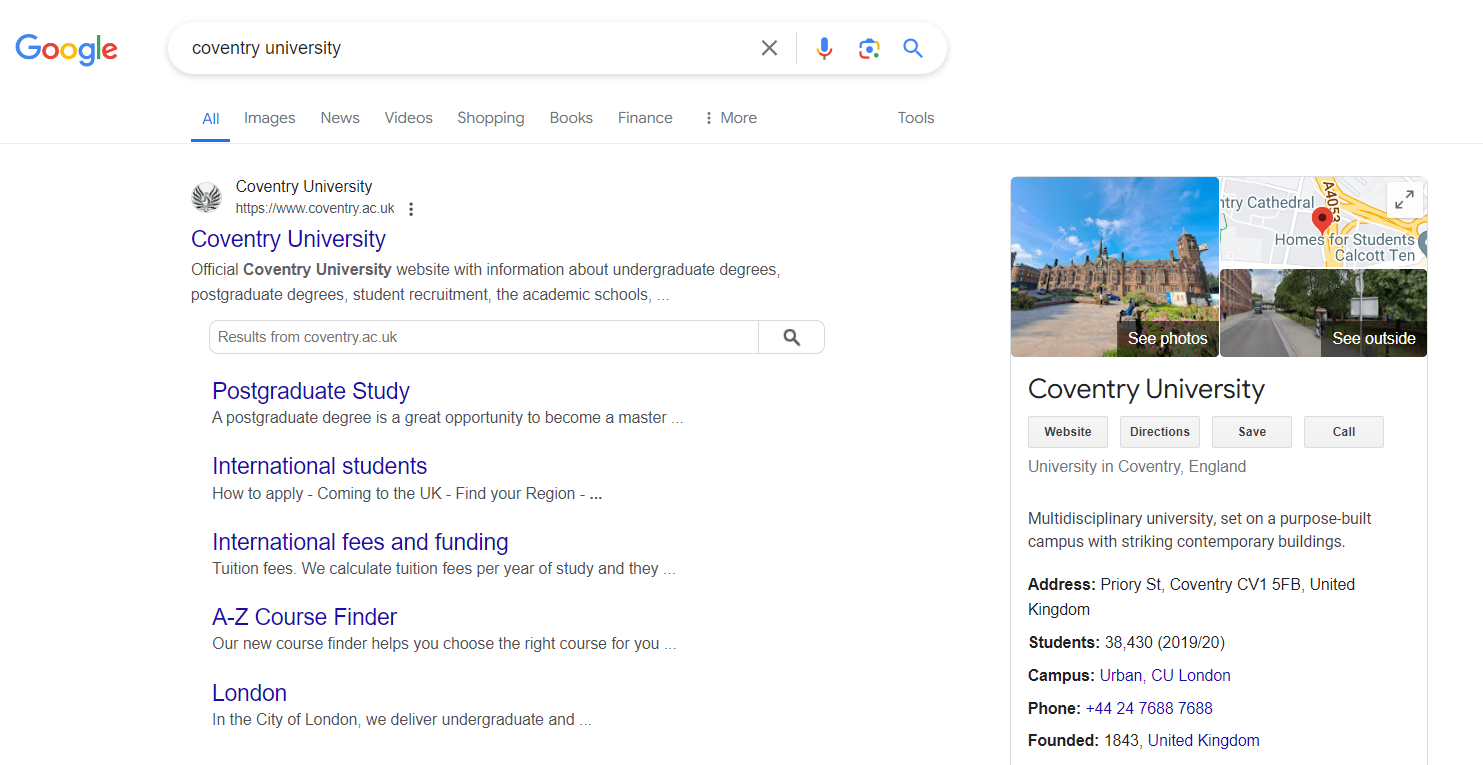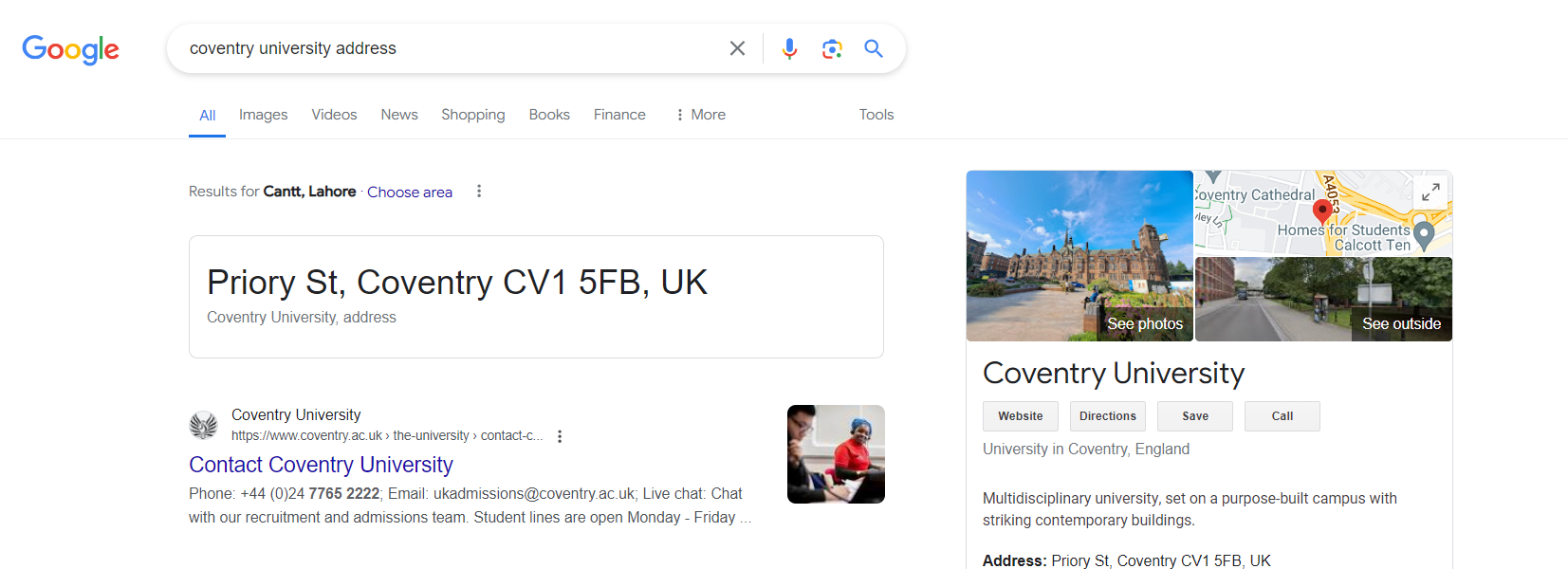UK Visa Interviews
Why do you want to study in the UK?
I have chosen the UK because
The UK institutions consistently rank among the best in the world and qualifications are
internationally valued and recognized. UK institutions offer the flexibility of choice and enable
you to blend academic and vocational courses of your choice. The teaching and study
methodology used in the UK give you the freedom to be creative and develop skills sets and
confidence. As a student you get the opportunity to be taught by the world’s leading academics
and experts; you also benefitfrom their constant academic support.
Why did you choose this university?
You should be able to list multiple positive factors that apply specifically to this University‐ such as academic quality, teaching facilities, Employability rate, TEF(Teaching Excellence Framework) rating, Ranking of the University, Student Satisfaction Rate, You should be able to explain what research you have undertaken and give detail aboutthe university’s facilities and location in the UK. If the interviewer thinks you have not researched the course or the university,they willrefuse your visa application. Note: All the parameters which you are going use such as TEF Rating, Student satisfaction rate, Facilities etc need further explanation why these have been the deciding factors for you to choose this University

Why did you choose to study this course?
You should demonstrate that you know about the course you have applied for, referencing specific modules of interest‐ what they involve and why they are of benefit to you. Think about any unique features of the course, for example, links to industry or professional accreditations and explain how the course will benefit you personally, for example; how it will relate to your previous study and what it will help you achieve for your future career plans. Please note in this question student should be aware of all the modules he is going to study in the particular course.
Provide details about two or three specific modules from the course you have chosen?
You should be able to name at least two modules and give details about the modules consistent with the website. You should have subject knowledge that means you can talk about what each module involves in more detailthan the title ofthe module.
Whichotheruniversities did youalso consider?
You should be able to demonstrate that you have made a serious and informed choice about this step
List other institutions considered and say why you chose this University above other Institutions
If you have looked at courses at home, you should state this
Explain why the equivalent degree in the UK will be of more benefit to you.
Where is your university located?

Where is your campus located?

What is your career plan?
You should explain how the course you applied for follows on from your previous study. You should explain your future career plans, e.g.what job you want to get and show that the course you want to study is necessary to achieve this. You should explain the value of the qualification to an employer as well as how the skills and knowledge you will gain from the course will help you succeed in your plans.
How will the course you have chosen help you in your chosen career?
You should be clear about the benefits that the course would give you, stating that your profile will be good enough to get you good opportunities in the home country once you do your course. Mention how your home country is growing and how you want to be a part of that growth. State some technical words expressing the advancements in your field. This is the challenging course for the developing country and it would open a Plethora of job opportunities. As my country is now growing and every foreign company is investing here so after my study, I will have been a part of this growth.
Who is financing your studies?
This is another way of checking your income source. Answer specifically what your father does. Never show him to be idle, because that means your income has drastically reduced and works as a negative point. Mentioning that your father is retired may prove to be a negative point. You can mention that he worked for 30 years in ABC Company and now has his own consultancy dealing with (related to his past experience)
Parents: Either your father or mother.
Annual Income: Should be more than 40k pounds annual income.
Profession: What does your sponsor do.
Evidence: You could be asked for evidence of your sponsor’s profession.
Accommodation
Where will you stay in the UK
Once you know which campus you are going to study you have to find out accommodation.
Travel Distance
When you have found out which place you are going to stay the next thing is to find out the distance from your campus to that place where you will stay.
I considered
Australia, USA, and Germany

Why Didn’t you go to those countries?
Why did you choose foundation course?

If youhave been offered foundation course with your
main program
I have been offered main course with a foundation program. A foundation programme will provide me with the specific set of skills and knowledge necessary for university admission. This targeted preparation will make studying infinitely easier and will provide me with a unique advantage and after completing my foundation program successfully I will be able to progress to the main course.
Maintenance
Maintenance Cost
Inner London, £12006.00
(£1,334 per month × 9
months)
outer London £9207.00
(£1,023 per month× 9
months)
Breaking Down the living cost
Accommodation
Food
Mobile phone/ Clothes / Shoes
Books / Stationery/Groceries
Travel / Transport
Dependent other than you
If you have siblings try to
show that your father is
financially solvent to take
care all of them beside
spending money on you
Kindly check latest funds requirements at
Tell me about the location of your campus
It is important that you review the location of the university campus and housing while deciding the
university.
List all the pros that you think an ideal place should have. They mightinclude:
➢Access to good publiclibrary
➢Jobopportunities
➢Sociallife
➢Studyenvironment
➢Industriallink
➢Cost ofliving(Londonis veryexpensive)
➢Universityfacilities
➢Safety
➢Transportation
➢Weather
➢Building style(modernorhistorical?)
How to prepare
How to Prepare
Below are a few tips that will help you ace the UK credibility interview:
Q. Why do you want to study in the UK rather than your home country or another country?
Bad answer:“I heard the UK is a nice place, and people are friendly.I can speak English there.I always wanted to see London, and I like Premier League football.Also, in my country,job opportunities for graduates are limited.”
Good answer:“I’m studying engineering, and theUK has a strong reputationfor excellence in teaching engineering degrees.
Once I graduate, I should be able to get a good job back in my home country and have a strong future because of my UK degree.I have a longstanding interest in British culture,and I’mreally interested in seeing the galleries and museums in the UK.” The difference:The first answer is fartoo generic.The final sentence contains a big red flag:“In my country, job opportunities are limited for graduates.” It implies that the student may want to remain in the UK after graduating. On the other hand, the
second response focuses on the specific course and how it will help the studentland a good job back in their home country.
Q. Whythis specific university over other options?
Bad answer:“My cousin went to this university, and he said itwas good.”
Good answer:“This university is well-known in my country, and its reputation will help me get a great job when I return. The degree subject has a good national ranking, and the university has a strong reputation for teaching. I looked at other universities [provide the names], but the course modules they offer aren’t as helpful for my futuregoals.”
The difference: It’s common for students to say that they know someone who studies at the university, which is why they wantto study there.Instead,talk aboutthe university’s reputation and how studying therewill help set you up for future success.Also, be specific about why this university was more suitable than others you considered.
Q. What will you do after completing your studies in the UK?
Bad answer:“I will try and see if there is a job I can get in the UK as I don’t want to returnto my home country.”
Good answer:“I am studying business, and I want to work for a large multinational such as [name(s)]. One of the units in my course is on Business Analytics. I want to get a job as a business analyst when I get back to my home country. The salary for this position is approximately £1,200 per month, whereas a regular graduate role pays about £700 per month.”
The difference: Again, the first answerimplies thatthe student wants to remain and work in the UK after graduating. The second response specifically mentions a large multinational back in their home country where the student envisions themselves working,how their course will help them obtain a specific job, and how much it pays.
Q. What have you been doing during your study gap?
Bad answer:“I’ve been looking for a job, but I haven’t found one, so I’ve been staying at home. Now I’ve decided to study abroad.”
Good answer: “I have been working in an entry-level role in a bank since graduating. But, I feel that I will advance further in the industry if I get a degree from the UK, and that is why I want to study there. When I graduate,I hope to returnto the same company and get a promotion.”
The difference:In the first answer,the student cannot provide a satisfactory explanation for how they spenttheir study gap, and the university may have reason to suspect that the student will remain in the UK after graduating. The second answer demonstrates the professional experience the student gained during their study gap. It also shows that they have done considerable research into the program and how studying in the UK aligns with their professional goals back in their home country.
Q. What are the facilities at the university, and what is the university’s ranking?
Bad answer:“The facilities are good, and the ranking is high.It’s much better than theuniversity in my hometown.I’m looking forward to seeing the facilitieswhen I arrive.”
Good answer:“The university is ranked at number 20 in The Guardian university league tables and in the top 50 in the Times Higher Educationleague tables.Also, the business school where I will study is accredited by theAACSB, EQUIS, and AAMBA, making it one of the best in the UK. They have recently invested £25 million in upgrading their facilities and have improved the library and sports halls. Now they have received five stars from QS ranking for their facilities.”
The difference: As you can see, the second response is much more detailed and specific about the university’s rankings and facilities. You can often find this information on the university’s website. Or, search Google News for recent articles on the university, upgrades to its facilities,inclusion in top university rankings, etc.
Some Important Questions
Q. What was the last course you successfully completed and when did you complete this?
Your answer must be consistent with the information you have previously supplied on your application form.
Q. Given your previous study history, how will this course assist you in your future plans?
You should explain how the course you applied for follows on from your previous study. You should explain your future career plans, e.g. what job you want to get and show that the course you want to study is necessary to achieve this. You should explain the value of the qualification to an employer as well as how the skills and knowledge you will gain from the course will help you succeed in your plans.
Q. Where is your University located and where will you live in the UK?
You should be able to say where City is geographically in the UK. You should say what kind of accommodation you will be staying in, for example, which Halls of Residence‐ it is important you know where your accommodation is in relation to the university and the cost of rent per week.
Q. How will you travel to the university each day and how much will this cost?
You should say how far from the university the accommodation is and how much it will cost to get there each day. If it is within walking distance, the cost will be free, if further a field then you should be able to give some realistic estimates of public transport costs.
Q. How did you acquire the necessary funds to meet the course fees and living costs?
Your financial situation will be expected to mean that you do not need to be reliant upon work to fund your studies in the UK. The source of your income should be realistic‐ for example if your father is to pay your fees or support your living costs but has a salary of £20,000 and two other dependants to finance, then this may be deemed to be unrealistic. You must be able to submit evidence of the source of your finance as part of the visa application. If the Interviewer feels the money you are saying you are going to use is not realistically available they will refuse your visa application ‐even if you have been awarded the 10 points for your maintenance.
Q. Have you ever applied for a visa to visit another country a visa to enter another country?
You should list previous visits and purpose of visit.
Q. What countries have you visited and what was the purpose of your visit?
You should give full answers and ensure that they are consistent with your employment and study history.
Q. Have you ever had a visa application refused ‐ If so why was it refused?
Having had a visa refused previously may count against you but it doesn’t automatically mean this visa application will be refused. It’s important that you tell the interviewer about any refusals you have had and explain the reasons for the refusal. You need to demonstrate that you understand the reason for the refusal and explain why this will not happen with this visa application.
Q. What facilities are available at the University?
You should talk about any general facilities that are of interest to you, such as syndicate rooms in library as well as facilities specific to the course they you are applying for.
Q. Do you know where University is located, and how many students attend?
You need to show genuine, independent research has been undertaken, and be able to describe where University is located. You can find this Information on the University website.
Q. Have you ever been deported from the UK or stayed in the UK after your visa has expired?
You should have clear and logical reasons for studying in the UK. You should explain why coming to the UK to study this course is a better option than studying a similar course in another English‐ speaking country or your home country.
Q. Provide details about two or three specific modules from the course you have chosen?
You should be able to name at least two modules and give details about the modules consistent with the website. You should have subject knowledge that means you can talk about what each module involves in more detail than the title of the module.
Q. How is the course assessed and how many hours of study a day?
You should be able to say whether the course is a combination of exams, course work or learning consistent with the website.
Q. How does the course relate to your previous study?
Explain about the course you have applied for, and that it is a progression from what you have studied previously; how it will enhance your previous study in terms of content and level.
Q. What are your future career plans?
You should have of a clear plan for once you have finished your course, in terms of career plans or further study. The plans should be relevant to the course, realistic and the proposed course should be a necessary step to achieve your aim ‐i.e you could not get the Job you want without taking studying this course first.
Q. How long is your course and what qualification will you receive?
You should be able to explain the length of the course in years and the qualification you will gain at the end of it.
Q. How do you explain the gaps in your education/employment history and why are you returning to study now?
If you have had a break in study, you need to explain why it is you are returning to education now, and what the break in your studies was for. For example, is the course you intend to study a requirement for you to reach the next stage in your career? Did you take a break in your studies to earn money to pay for this course‐ if so, is this evidenced in your financial documents?
Q. How much will your course fees be?
You should know the exact cost of your tuition fees per year.
Q. How will you pay for your studies?
You should have a sustainable and credible source of finance that is sufficient for the student not to rely on work. You must provide evidence of this when applying for your visa.
Q. If father/parents paying for study, what job do they do and how much do they earn a year?
This amount must realistically be enough to support you and meet any other commitments during your studies. If it is not realistic, your application will be refused.
Q. Do you know how much your living expenses will be?
You should have some knowledge of the cost of living and an ability to meet that cost of living without relying on work.
Q. If you intend to work in the UK, do you know how many hours you are allowed to work?
You should know the rules on working (20 hours a week term time for degree level or above, 10 hours per week for below degree level), but be clear that work is not a priority for you. If you have no plans to work part‐time, you should make this clear.
Q. Do you have any other personal commitments that would make studying in the UK difficult, such as a family at home?
If you are coming to the UK to study while having commitments such as a family back home for whom you are the main provider, you will need to explain how you will remain focused on your studies and not over‐reliant on work in the UK to meet your commitments at home.
Q. If the costs of pursuing your course of study are higher in the UK than in your home country, why have you decided to incur the extra costs involved with studying in the UK?
Think about the advantages that a degree from the UK might give you and why you and/or your family are prepared to make this investment. Have you made a realistic assessment of all the costs involved and how you plan to pay for them? These costs include the course fees and living costs, including accommodation.
Q. Do you plan to work in the UK?
You cannot rely on funds from working to pay your course fees and living costs so you need to be aware of this. The main purpose for being in the UK is your studies, so if you do hope to work, think about how this would enhance your academic studies. You also need to demonstrate an understanding of the hours you are allowed to work and typical rates of pay.
Q. Can you tell me the location of the university/college?
You should do some research on your university before the visa interview. You should know its exact location and the locations of different campuses as well (if any). The location might be one of the reasons that you selected this particular university, so make sure that you know its exact location. Yes. You should do some research on your university before the visa interview. You should know its exact location and the location of its different campuses as well (if any).
Q. If you are awarded a U.K degree, would you like to return for Higher Studies?
You should be able to convince the Visa Officer that you are interested in taking your higher studies in the U.K because of the high quality of education. Highlight the differences between studying in the U.K and your home country. Tell the Visa Officer (V.O) that how studying in the U.K will add value to your profile.
Yes, I would like to go to the UK again for higher studies because of the high quality of education and ample research facilities. Moreover, the quality of faculty is far better in the U.K.
Q. What is the Scope of your Course?
Prepare a good statement stating how this course adds value to your profile and how this course will benefit you when you return to home country after completing your studies. The course will open new horizons for me and there are excellent job prospects for me in your country name for example Bangladesh after completion of my course.
Q. How much Money can you earn after your completing your Studies?
Since you intend to return to the home country, you should mention the amount in your local currency. Be authentic and realistic and don’t mention any unrealistic figure. Do some research on how much an Alumnus of your University is earning and what is the average salary package in the industry you are targeting to work.
Q. What proof do you have that your sponsor can support your Studies?
This question is a part of verifying your supporting documents. Visa Officer would like to see proof of having sufficient funds to meet your expenses. You should properly organize all your documents and as soon as the visa officer ask for the proof, handover the sponsor statement, bank statement and other financial documents that proves that your sponsor can support your studies.
Q. Do you have any relative or friend in the U.K?
Be truthful at this instance. Visa Documents will have a record of this (about your brother/sister/Mother/Father) with them. If your distant Aunt or Uncle stays there, then you don’t have to say about them. All that matters is your immediate relatives i.e. own brother, sister, father or mother. Any of your relative overstaying in U.K may not be favorably considered.
Q. Who all are the earning members in your Family?
Visa officer wants to know if you have a strong financial background. Mention your Father, Mother, a brother and all who are earning steadily.
Q. What is the course commencement date?
You should remember the exact dates. Please read your offer letter and brochure carefully before the Visa interview.
Q. What will be the Total cost of Studies per year?
You should be well aware of your tuition fees and other expenses and how they will be met. Mention the tuition fees and the living expenses.
Q. What Will You Do During The Off Period/Semester?
You should mention your strong ties to the home country. You can say that you plan to go back to your home country to meet your family and friends. You should not say that
you plan to work in the U.K as that shows you are not financially strong and you are going there to earn money.This will make the Visa Officer believe that even after completing
your education, you would like to have a job and settle there. These kinds of questions are asked to check your intentions.
I plan to go back to meet my family and friends in my country.
Q. How Much Money Is Available For Your Stay In The U.K?
Mention the amount as per financial documents. Visa Officer wants to know if you have sufficient money to pay for your education.
Q. Have you researched your Career Prospects?
Your answer should reflect clarity of thought, clarity of your intentions, and strong ties to your home country.
Yes. I am sure the recent growth of my country’s economy will open many avenues for me to start my industry. After getting acquainted with the latest technologies in the U.K, I
look forward to starting my industry in my country.
Q. What are the facilities at the university?
Bad answer: “The facilities are good, and the ranking is high. It’s much better than the university in my hometown. I’m looking forward to seeing the facilities when I arrive.”
Good answer: “The business school where I will study is accredited by the AACSB, EQUIS, and AAMBA, making it one of the best in the UK. They have recently invested £25
million in upgrading their facilities and have improved the library and sports halls. Now they have received five stars from QS ranking for their facilities.”
Possible answer should include: Secured Accommodation, Library, sports facilities, Gym , Additional classes to learn foreign language and development of interpersonal and employability skills, small class size, career supervisor, transportation link.
Q. Do you understand the responsibilities of students entering the UK under Tier 4 of the PBS?
Possible information need to tell:
Attending regular classes and attendance shouldn’t be fall below 85% or as per university policy
No full time employment
Part time work as specified on your visa
No business activity on student visa
Q. Do you know whether you are entitled to work part-time in the UK? Do you know how many hours are you allowed to work?
Possible information: If you are going to study level 6 or above program in the HEI then you are allow to work 20 hrs per week. Students are allowed to work 10 hrs per week for any program below level 6 in HEI. No work is allowed in Private or Government College.
Q. Do you intend to work in the U.K after the completion of your Studies?
Visa officer wants to know your intentions whether you have plans to return to your home country after completing your studies or not. You should read the immigration policies carefully on the Embassy website. No. After completing my studies, I plan to return back to my home country and join my father’s business to help grow it.

